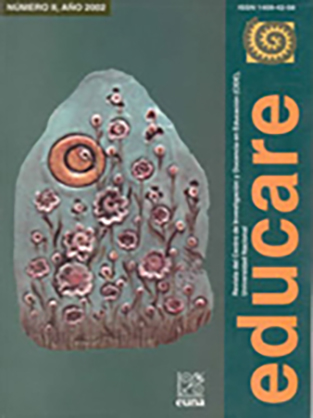Globalización y posmodernidad: desafíos al aprendizaje
DOI:
https://doi.org/10.15359/ree.2002-2.1Abstract
At a time when academic discourse is less listened to and the messages of publicists, journalists and writers of the so called “light texts” cause a much greater impact on the people, a question arises: Which ethical stand can a college professor take in postmodern times?
In the global village, the most powerful economic forces take a toll on people and cultures everywhere alike. In the rapid expansion of globalization, the transmission of information plays a critical role.
"To be an academic" in postmodern times implies a major challenge, for knowledge cannot be transformed easily into consumers' goods, without running the risk of losing its essence when transformed into another market commodity.
It looks as if in the mid of a desolating panorama, only the strengthening of the person in his/her own experiences, thoughts, wishes and feelings can lead us towards a utopia, namely, to dream and recreate a university aimed humanity's well-being.References
Bartoli, H. (1996). "Mundialización y desorden". En Cuadernos de
Marcha, No. 113.
Beck, U. (1998). ¿Qué es la globalización?. Barcelona: Paidós.
Flecha, R. y Tortajada, l. (1999). "Retos y salidas educativas en la entrada de siglo". En La educación del siglo XXI. Barcelona: Morata
Follari, R. (1990). "Perfil del docente y crisis cultural contemporánea".
En Novedades educativas, No. 59.
Freire, P. (1998). La pedagogía de la autonomía. Barcelona: Siglo XXI.
García Canclini, N. (1999). La globalización imaginada. México D.F.:
Paidós.
Gimeno Sacristán, J. ( 1997). Poderes inestables en educación. Barcelona: Morata.
Ianni, O. (1997). Teorías de la globalización. México D.F.: Siglo XXI.
Lipovetsky, G. (1986). La era del vacío. Barcelona: Anagrama.
Magris, C. (2000). "Utopía y desencanto". En Archipiélago, No. 40, pp.
- 127.
Peralta, V. (2001). Globalización y construcción curricular: tensiones y
posibilidades. Una perspectiva desde Latinoamérica. (Mimeografiado).
Riché, P. (Mayo, 2000). "Le monde diplomatique". En Brecha digital,
suplemento especial.
Sánchez Ruiz E. Globalización y convergencia: retos para las industrias
culturales latinoamericanas. Universidad de Guadalajara: Mimeografiado.
Scarlato, F. C. et al (l 994). O novo mapa do mundo. Globalizacao e espaco Latino -Americano. Ucitec/ANPUR: Sao Paulo.
Published
How to Cite
Issue
Section
License
1. In case the submitted paper is accepted for publication, the author(s) FREELY, COSTLESS, EXCLUSIVELY AND FOR AN INDEFINITE TERM transfer copyrights and patrimonial rights to Universidad Nacional (UNA, Costa Rica). For more details check the Originality Statement and Copyright Transfer Agreement
2. REUTILIZATION RIGHTS: UNA authorizes authors to use, for any purpose (among them selfarchiving or autoarchiving) and to publish in the Internet in any electronic site, the paper´'s final version, both approved and published (post print), as long as it is done with a non commercial purpose, does not generate derivates without previous consentment and recognizes both publisher's name and authorship.
3. The submission and possible publication of the paper in the Educare Electronic Journal is ruled by the Journal’s editorial policies, the institutional rules of Universidad Nacional and the laws of the Republic of Costa Rica. Additionally, any possible difference of opinion or future dispute shall be settled in accordance with the mechanisms of Alternative Dispute Resolution and the Costa Rican Jurisdiction.
4. In all cases, it is understood that the opinions issued are those of the authors and do not necessarily reflect the position and opinion of Educare, CIDE or Universidad Nacional, Costa Rica. It is also understood that, in the exercise of academic freedom, the authors have carried out a rogorous scientific-academic process of research, reflection and argumentation thar lays within the thematic scope of interest of the Journal.
5. The papers published by Educare Electronic Journal use a Creative Commons License:














 The articles published by Educare Electronic Journal can be shared with a Creative Commons License:
The articles published by Educare Electronic Journal can be shared with a Creative Commons License: 



